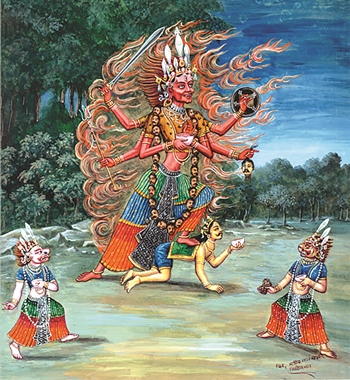Living Human Treasure In Nepal

Shaphalya Amatya
The sad demise of a veteran traditional artist, painter Mr Prem Man Chitrakar recently has reminded me of the International training workshop on living human treasures organised by UNESCO at Venice in February 1999.
Prem Man was an institution by himself and was trained by his father Prithivi Man Chitrakar, who himself was a renowned paubha painter.
Artist Prem Man Chitrakar devoted his entire life in paubha painting. I remember once he took me to his old residence at Bhimsensthan and showed me a paubha, in which he was giving a finishing touch. This painting was of Shree Yatra. He was commissioned to make this paubha by a rich foreigner.
Prem Man told me that he was working in this painting for the last six months. Curiously, I queried him what could be the price of this artwork. He asked me to guess. Then randomly I told him that it might cost about Nepali Rs. 100,000. With a smile, he told me that this painting would at least fetch his about Rs. 300,000.
How many paubhas he has painted and how many works he has left behind for posterity we do not know. But, I am sure his creations are the heritage or valuable cultural property of our country. I am also confident that he might have trained some Nepalis in his discipline for the continuation of this traditional art.
I hope his disciples will give continuity to his artworks. He was one of the 'Living Human Treasures' of our country. We should always remember him for his creations.
In our country, we do not have any provision to recognise and honour someone who has contributed a lot for the preservation, protection and promotion of intangible cultural heritage. All prominent practitioners of traditional arts with the highest degree of knowledge and expertise who wish to transfer their skills to future generations should be considered as –' Living Human Treasures'.
In the Newar community's Maharjans, Manandhars and some other groups, people have a strong tradition of fathers, uncles, and other senior members of the communities teaching new pupils or people of the young generation about their vocations. Transferring knowledge and knowhow to the new generation and the continuation of training to professionals is very essential to preserve and promote our heritage and traditional craftsmanship.
People should protect their cultural roots. They should value them and cherish them. One should respect one's own culture, otherwise, he or she would not be able to respect and appreciate the culture of others.
Living human treasures should be protected and promoted by any state and society. It will be a crime if we do not protect these perfect brains, who are creating, preserving and promoting our arts or intangible cultural heritages. However, owing to a lack of transfer of knowledge from one generation to another in our communities, our numerous intangible heritages have been vanishing and some of them have already vanished.
Our country is the home of numerous tribes, communities and social groups adhering to different cultural traditions. Nepal is a treasure-trove of traditional/folk performing arts such as dance, music, singing traditions etc, impressive for their variety and individuality.
Though the caste system in our society has many drawbacks, it has played a vital role in maintaining, preserving, and promoting traditional arts in our country. Being basically an agricultural society. Almost all important traditional/folk performing arts of our country have been influenced by this class or farming class. In a way, they are the backbone and forerunners of the intangible cultural heritage of our country. They are the chief architects and actors of our cultural traditions. Without their participation, it will be impossible to organise festivals in our country.
Without establishing the system of 'Living Human Treasures' it will be very difficult to preserve and promote our cultural traditions. With the rapid growth of the economic development of the country, people are becoming more materialistic. They tend to forget their cultural heritage, their roots and cultural identity.
The intangible cultural heritage of our nation is almost in a stage of dying out or disappearing. Certain important intangible cultural properties such as traditional dance and music, traditional games, the know-how of the making of handicraft, traditional performing arts, oral traditions, and other intangible cultural heritage are being replaced by the modern information technology. Therefore, it is very important to stop the disappearance of traditional cultural heritage.
One of the most effective ways to prevent this disappearance is to introduce the system of 'Living Human Treasures' to our establishment. For achieving the goal of protecting intangible traditional heritage, 'Living Human Treasures', we need to formulate appropriate legislation or introduce measures.
(Amatya is culture expert)
Recent News

Do not make expressions casting dout on election: EC
14 Apr, 2022
CM Bhatta says may New Year 2079 BS inspire positive thinking
14 Apr, 2022
Three new cases, 44 recoveries in 24 hours
14 Apr, 2022
689 climbers of 84 teams so far acquire permits for climbing various peaks this spring season
14 Apr, 2022
How the rising cost of living crisis is impacting Nepal
14 Apr, 2022
US military confirms an interstellar meteor collided with Earth
14 Apr, 2022
Valneva Covid vaccine approved for use in UK
14 Apr, 2022
Chair Prachanda highlights need of unity among Maoist, Communist forces
14 Apr, 2022
Ranbir Kapoor and Alia Bhatt: Bollywood toasts star couple on wedding
14 Apr, 2022
President Bhandari confers decorations (Photo Feature)
14 Apr, 2022










